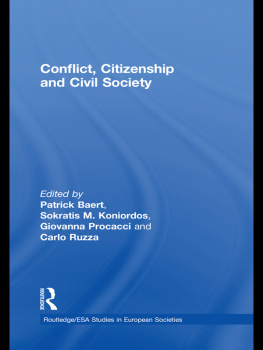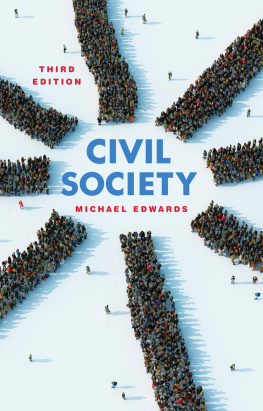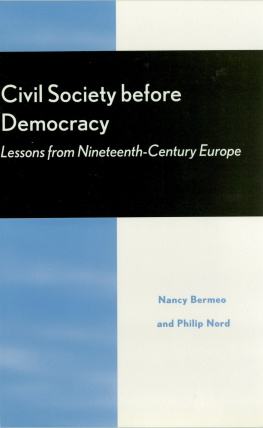ROUTLEDGE LIBRARY EDITIONS: SOCIAL THEORY
Volume 11
CIVIL SOCIETY
CIVIL SOCIETY
KEITH TESTER
First published in 1992
This edition first published in 2015
by Routledge
2 Park Square, Milton Park, Abingdon, Oxon, OX14 4RN
and by Routledge
711 Third Avenue, New York, NY 10017
Routledge is an imprint of the Taylor & Francis Group, an informa business
1992 Keith Tester
All rights reserved. No part of this book may be reprinted or reproduced or utilised in any form or by any electronic, mechanical, or other means, now known or hereafter invented, including photocopying and recording, or in any information storage or retrieval system, without permission in writing from the publishers.
Trademark notice: Product or corporate names may be trademarks or registered trademarks, and are used only for identification and explanation without intent to infringe.
British Library Cataloguing in Publication Data
A catalogue record for this book is available from the British Library
ISBN: 978-0-415-72731-0 (Set)
eISBN: 978-1-315-76997-4 (Set)
ISBN: 978-1-138-78227-3 (Volume 11)
eISBN: 978-1-315-76371-2 (Volume 11)
Publishers Note
The publisher has gone to great lengths to ensure the quality of this reprint but points out that some imperfections in the original copies may be apparent.
Disclaimer
The publisher has made every effort to trace copyright holders and would welcome correspondence from those they have been unable to trace.
Civil society
Keith Tester
First published 1992
by Routledge
11 New Fetter Lane, London EC4P 4EE
Simultaneously published in the USA and Canada
by Routledge
a division of Routledge, Chapman and Hall, Inc.
29 West 35th Street, New York, NY 10001
1992 Keith Tester
Typeset by Michael Mepham, Frome, Somerset
Printed and bound in Great Britain by
Mackays of Chatham PLC, Chatham, Kent
The author asserts the moral right to be identified as the author of this work.
All rights reserved. No part of this book may be reprinted or reproduced or utilized in any form or by any electronic, mechanical, or other means, now known or hereafter invented including photocopying and recording, or in any information storage or retrieval system, without permission in writing from the publishers.
British Library Cataloguing in Publication Data
A catalogue record for this book is available from the British Library.
Library of Congress Cataloging in Publication Data
Tester, Keith, 1960
Civil society / Keith Tester.
p.cm.
Includes bibliographical references and index.
1. Civil society. I. Title.
JC336.T431992
306.2dc20
927782
CIP
ISBN 0415075165
0415075173(pbk)
Contents
For, on the one hand, men are constantly smashing, replacing and leaving behind them the natural, irrational and actually existing bonds, while, on the other hand, they erect around themselves in the reality they have created and made, a kind of second nature which evolves with exactly the same inexorable necessity as was the case earlier with irrational forces of nature
Georg Lukcs
And he watches the flow of life move by, majestic and dazzling. He admires the eternal beauty and the astonishing harmony of life in the capital cities, a harmony so providentially maintained in the tumult of human liberty.
Charles Baudelaire
I think it might be helpful to give a few ideas about how Civil Society can be read. However, I am quite aware that the book is in the public domain and so quite separate from whatever I might want for it. It is ultimately impossible for me to stop you doing whatever you want with the book (although I do reserve the right to object if my words are taken to lengths which I hold to be morally indefensible).
The book does not contain copious references to everything which has been said about what Jean Jacques Rousseau, for example, said about civil society. Neither does it refer to everything which has the words civil society in its title. (I am aware that this means that people can respond to my analysis by saying, Aha! But what about so-and-so?) My interest is in the hermeneutic stakes of the debates on civil society. I have not been at all interested to ask whether civil society really exists and, if it does, whether it is under attack or is a vibrant milieu of opposition to the state. I am more interested to know why people operate as if the tag civil society can be applied to some reality.
I have not written a complete guide to civil society. Firstly, I have always found diligent pieces of secondary literature to be amazingly boring (to read and, I suspect, often to write); secondly, I do not think that I am especially capable of writing that kind of survey; thirdly, I believe that secondary literature is profoundly dishonest. It is dishonest on the part of the writer, who is implicitly trying to pass off himself as an astonishingly erudite and well read conveyor of bits of objective information. It is dishonest on the part of the reader, who is more often than not trying to find a short cut around books which have a reputation for being tedious and unintelligible. I hope that if this book inspires anyone to do anything, it will be to read the original words of the likes of John Locke, Thomas Hobbes and Karl Marx (the latter in particular stands in very serious need of rescue from the impact of his erstwhile defenders and heirs). They are far more interesting and entertaining than I will ever be.
I suspect that in many ways I might have some sympathy for George Steiners distaste with meta-texts and with the situation in which, Monograph feeds on monograph, vision on revision Essay speaks to essay, article chatters to article in an endless gallery of querulous echo (Steiner 1989: 39).
It might be said that Civil Society looks at the immediate problem of the forest rather than at the relatively secondary matter of the foliage of the trees. Civil Society is intended to be a commentary on various texts and problems. It is in no way an account of them. I wrote the book as an essay in interpretation which seeks to develop and try out ideas rather than to provide ready-made answers. The book is perhaps best read as a series of sociological and philosophical speculations. is extremely speculative but, I hope, of some interest. The book is a text to be taken apart and, hopefully, questioned rather than picked up and plundered for the right answers.
If I might be permitted a brief self-advertisement, I should also point out that I wrote this book immediately after completion of my The Two Sovereigns (Tester 1992). It is therefore inevitable that Civil Society often assumes and alludes to points which were developed at a more leisurely pace in The Two Sovereigns. As such, and if anyone can be bothered, I would suggest that the two essays can be usefully read one after the other.









